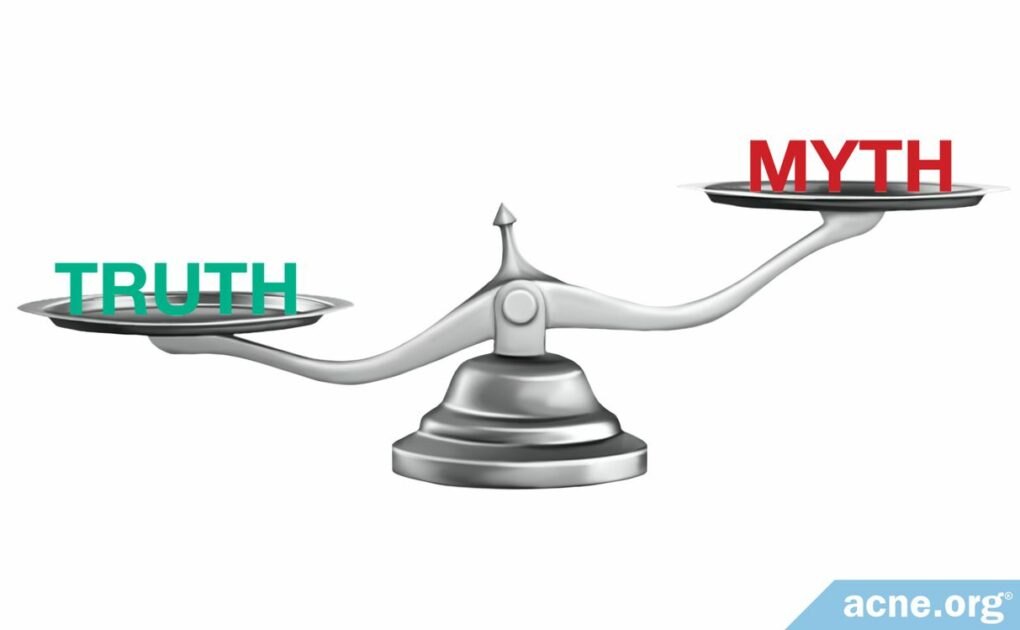Busting the Myths Surrounding Acne

The Essential Info
The Truth:
- Pimples aren’t caused by dirt: Pores are clogged inside the skin, not from the top down from getting dirt in your pores.
- Masturbation and/or sex doesn’t cause acne: This was a historical way to scare young people out of having premarital sex and has no scientific back-up.
- A sunburn won’t clear up your skin: Sunburns are skin damage that cause skin irritation. Irritation can lead to more acne.
- Eating perfectly won’t cure your acne: Eating a low-glycemic diet, lots of colorful fruits and veggies, and enough omega-3 fats could help, but even if you eat a “perfect” diet, it is unlikely to completely clear you up.
- It’s not only teens who get acne: About 20% of people between the ages of 20-70 have acne. But it does tend to lessen over time.
- Popping a pimple responsibly is OK: As long as a pimple has an obvious white or yellow center, you can pop it without causing problems.
- Bacteria on the surface of your skin doesn’t cause acne: Much like dirt on the surface of your skin, bacteria on the surface of your skin also won’t cause acne, so if you touch your skin and then touch another part of your skin, you won’t “spread” acne.
- Most dermatologists do not specialize in acne: Only about 2% of a dermatologist’s education centers around acne. When looking for a dermatologist, make sure you find one that specifically specializes in acne.

The Science
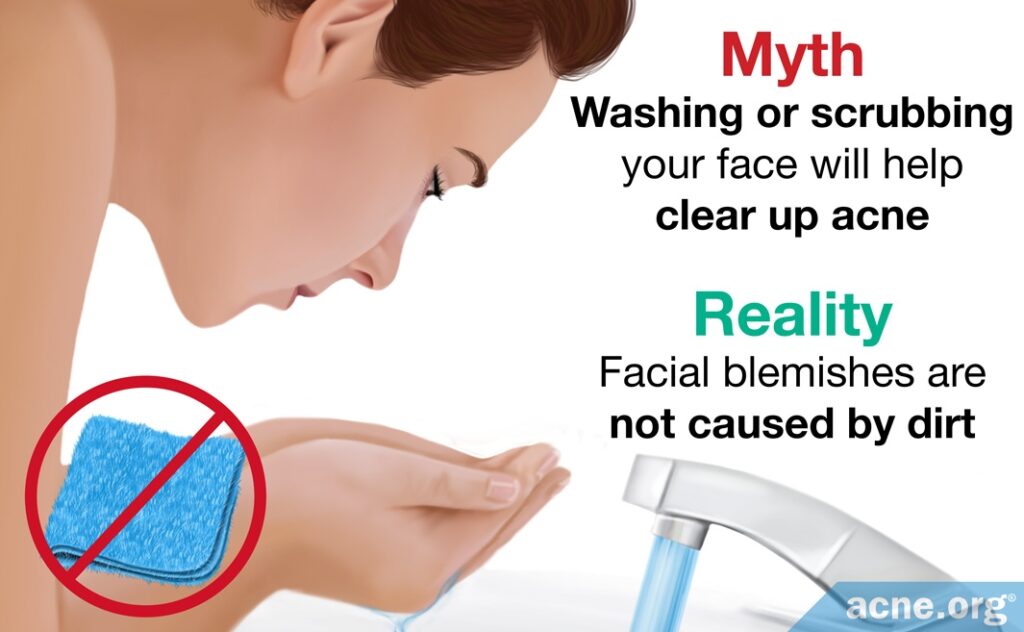
Myth: Washing or scrubbing your face will clear up acne
Truth: Contrary to what you have seen in commercials, pores do not get blocked from the top down due to “impurities.” Rather, the walls of a pore stick together inside the skin, starting acne formation.1 Far from preventing acne, frequent washing actually irritates pores, which can cause them to become clogged. A washcloth or any other cleansing device can add even more irritation. The best bet is to wash very gently with bare hands and only wash twice a day.2
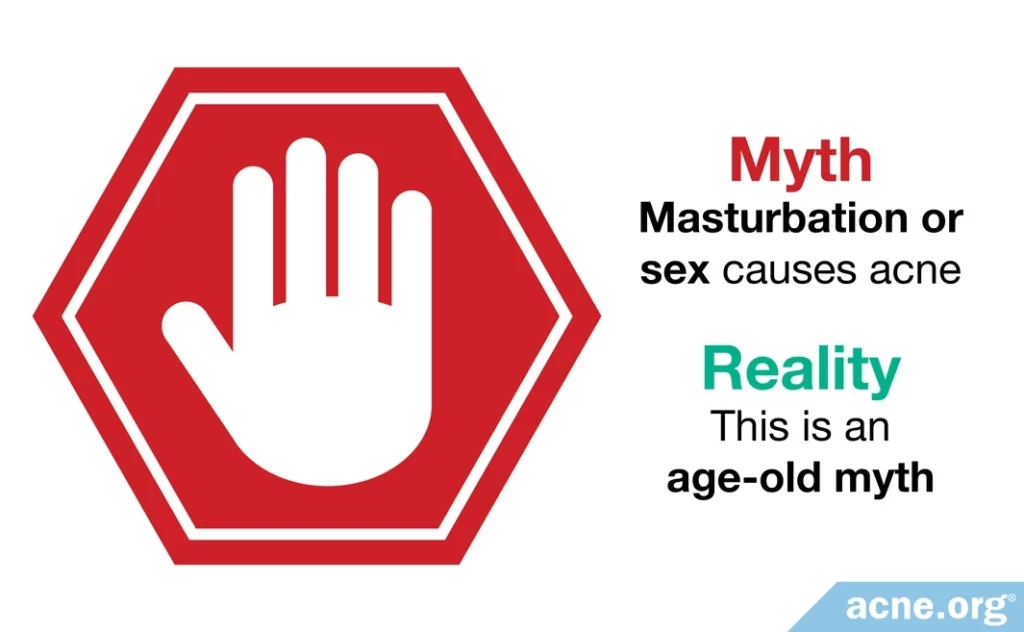
Myth: Masturbation or sex causes acne
Truth: This antiquated notion, originating as early as the 17th century to discourage young people from having premarital sex, is not based on scientific evidence.
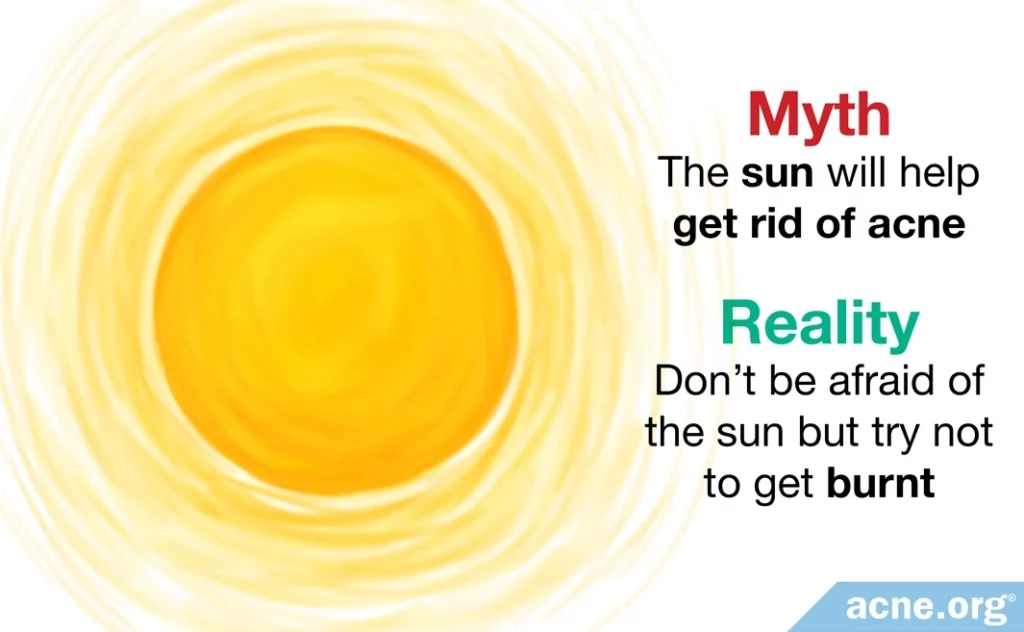
Myth: The sun will help get rid of acne
Truth: Sun exposure is the main way our bodies make vitamin D, an important vitamin that just might help reduce acne symptoms. However, overly exposing your skin to the sun creates skin damage, which leaves the skin irritated. This irritation can result in more acne in the weeks following overexposure as the skin heals itself. If you notice a breakout “out of the blue,” ask yourself if you got sunburnt about two weeks ago. That may be the cause.1-3 People with the lightest skin can get up to 20 minutes per day of unprotected sun exposure without causing issues with acne, and people with the darkest skin skin can get up to 2 hours per day.
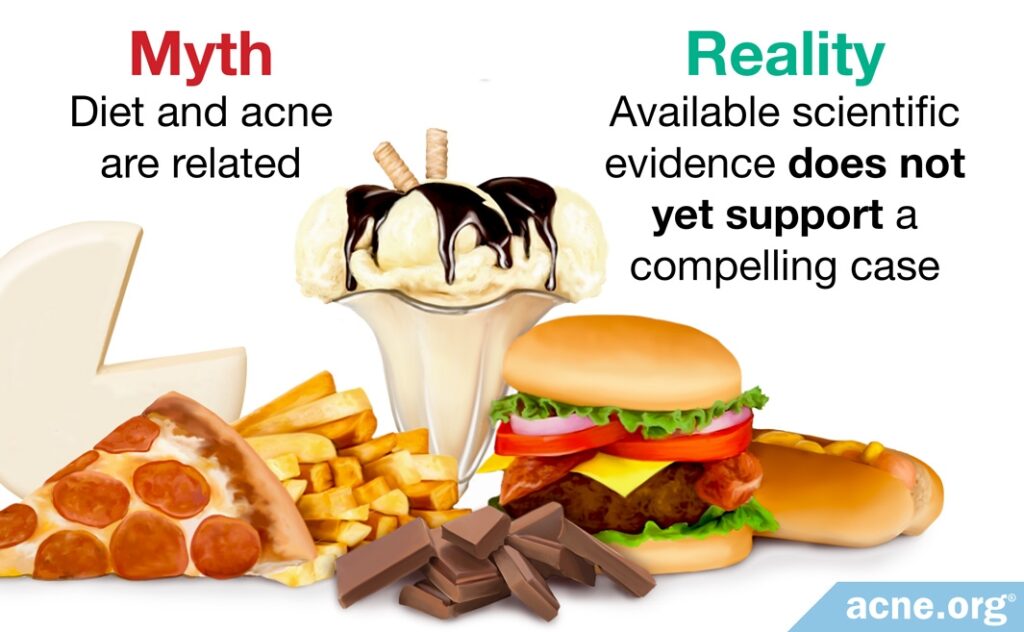
Myth: A perfect diet will cure acne
Truth: It is possible that eating better may be able to reduce acne, but it is unlikely that diet alone will completely eliminate acne. The bottom line is we need more research on the diet and acne connection in order to find out if there is a “silver-bullet” diet that can really knock out acne. We do know that people in some hunter/gatherer societies do not experience acne whatsoever across the entire population. This is in stark contrast to the widespread presence of acne throughout all modern society. This leaves us to ponder whether the indigenous people’s unprocessed diet contributes to their acne-free skin or whether their clear skin is a result of genetics or some other factor. However, we may live so differently from our ancestors that it has become close to impossible to replicate our ancestral diet.1-2,4-6 While we wait for research to come in, based on what we know so far it may be prudent to eat a low-glycemic diet, enjoy lots of colorful vegetables and fruits, and supplement with 30 mg of zinc gluconate per day and up to 6 fish oil pills per day (or up to 3 “concentrated fish oil pills).
Note: If you feel that you have cleared your acne using a particular diet or if you are planning on attempting a diet of some kind, please post your method on the Nutrition & holistic health forum. Keep in mind that almost any diet will appear to work in the short term because as your body loses weight, insulin and other hormones react and acne tends to recede. Then, as body weight levels out or increases, acne symptoms tend to return. Any legitimately effective anti-acne diet should continue working after the initial weight loss period.
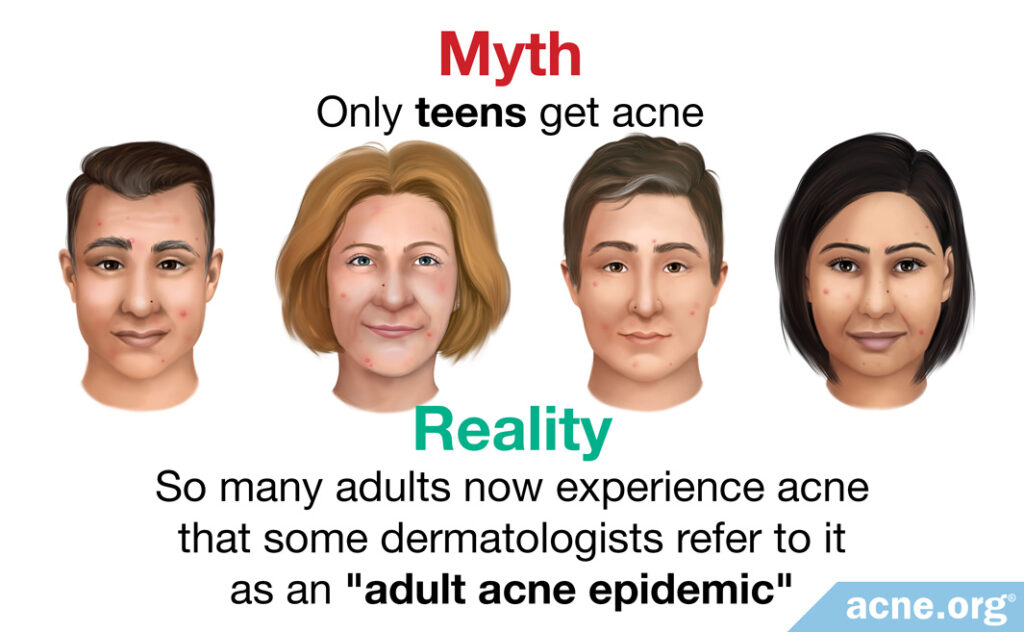
Myth: Only teens get acne
Truth: About 50% of adults between 20-30 years old battle acne. This number lessens with time, but overall about 20% of adults between 20-70 suffer with acne.7-9 The good news is that it is treated the same way in an adult as in a teen.10-13
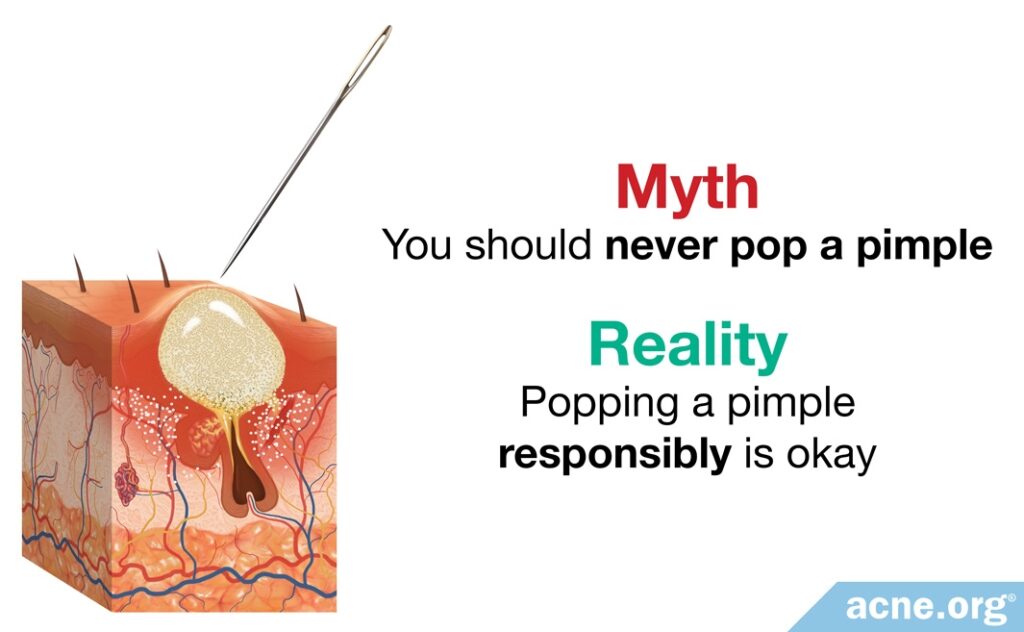
Myth: You should never pop a pimple
Truth: If you search online, the majority of sources specifically warn against popping a pimple. However, this advice is never based on scientific evidence. While it is a bad idea to attempt to pop pimples which do not have a white or yellow center because this can cause the pimple to become more severe and increase the chance of scarring, popping a zit which is does have a white or yellow center can actually eliminate the infection and initiate healing. Popping must be performed correctly to achieve the best result. Also, it is vital that popping should never be combined with picking of the skin. Countless plastic surgeons who specialize in acne scar correction will tell you that picking the skin causes as much or more scarring than the initial acne lesion itself.
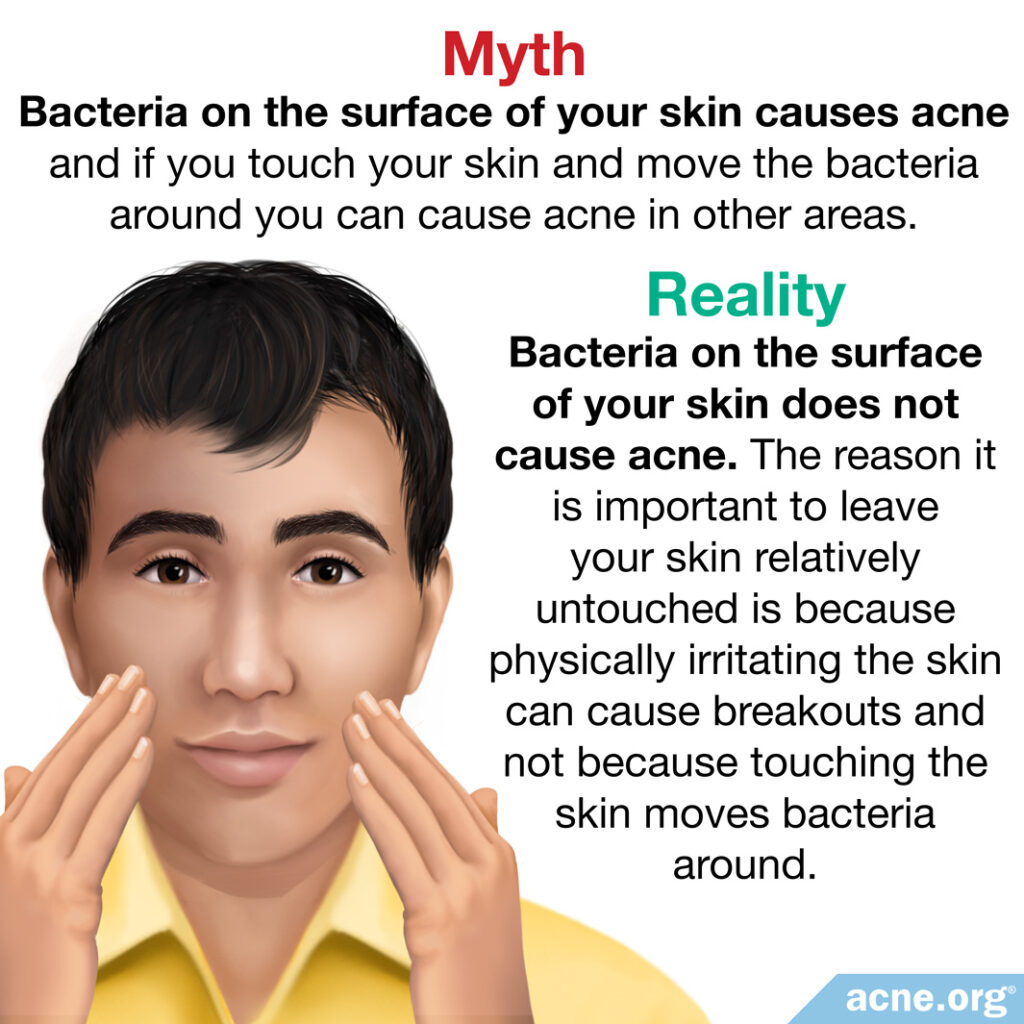
Myth: Bacteria on the surface of your skin causes acne
Truth: It is the bacteria deep within your pores (called C. acnes) that are part of the acne formation process and not the bacteria on the surface of your skin. The reason it is important to leave your skin relatively untouched is because physically irritating the skin can cause breakouts and not because you are moving bacteria around.14
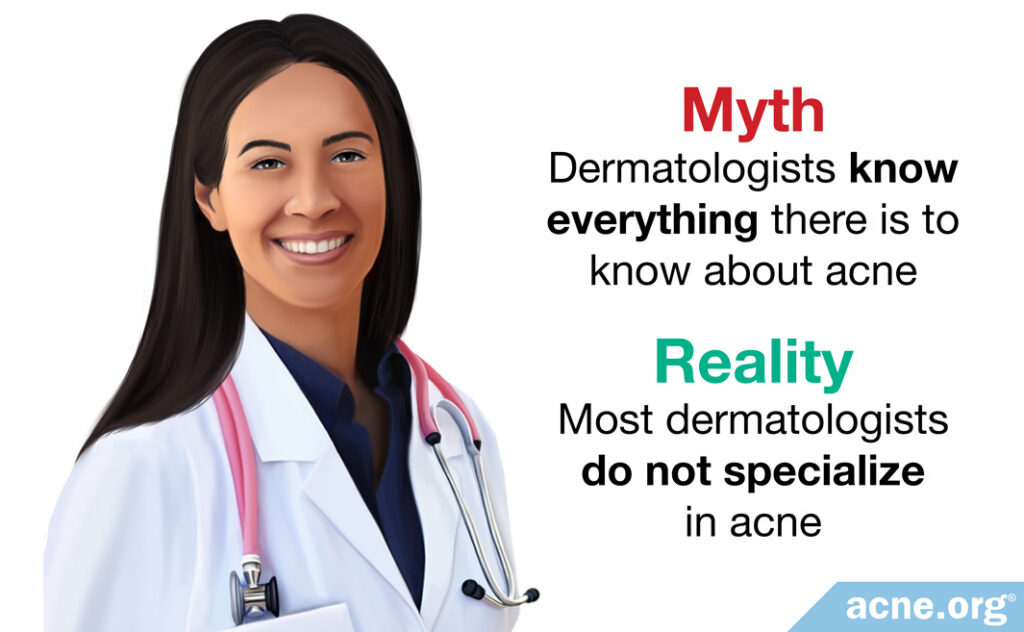
Myth: Dermatologists know everything there is to know about acne
Truth: Even though acne is the main reason people see dermatologists in many countries, this does not mean that a dermatologist is a specialist in acne unless she specifically decided to focus her practice on this area. Becoming a dermatologist requires a person to study and understand a huge list of skin diseases, and acne is simply one of many, accounting for only 2% of dermatology textbooks. It is important that an acne sufferer be his own advocate when it comes to acne and learn everything he can about available treatments before speaking with a dermatologist to prevent a revolving door of prescriptions which very often do not provide adequate clearing of the skin.
References
- Questions and Answers About Acne. National Institute of Arthritis and Musculoskeletal and Skin Diseases Jan. 2006. National Institutes of Health. 2001. https://www.niams.nih.gov/health-topics/acne
- Magin, P., Pond, D., Smith, W. & Watson. A. A systematic review of the evidence for ‘myths and misconceptions’ in acne management: diet, face-washing and sunlight. Fam. Pract. 22, 62-70 (2005). https://www.ncbi.nlm.nih.gov/pubmed/15644386
- Gfesser, M. & Worret. W. I. Seasonal variations in the severity of acne vulgaris. Int. J. Dermatol. 35, 116-117 (1996). Abstract. PubMed. 15 Apr. 2002. https://www.ncbi.nlm.nih.gov/pubmed/8850040
- Diet best medicine for pimply problem – study. RMIT.edu. 2 Apr. 2007. https://www.ncbi.nlm.nih.gov/pmc/articles/PMC4884775/
- Cordain, L. et al. Acne Vularis: A disease of Western civilization. Arch. of Dermatol. 138, 1584-1590 (2002). https://www.ncbi.nlm.nih.gov/pubmed/12472346
- Cordain, L. Implications for the Role of Diet in Acne. Semin. Cutan. Med. Surg. 24, 84-91 (2005). https://www.ncbi.nlm.nih.gov/pubmed/16092796
- Cunliffe, W. J., Goulden, V. & Stables, G. I. Prevalence of Facial Acne in Adults. J. Am. Acad. Dermatol. 41, 577-580 (1999). https://www.ncbi.nlm.nih.gov/pubmed/10495379
- Knaggs, H. E., Wood, E. J., Rizer, R. L. & Mills, O. H. Post-adolescent acne. Int. J. Cosmet. Sci. 26, 129-138 (2004). https://onlinelibrary.wiley.com/doi/abs/10.1111/j.1467-2494.2004.00210.x
- Collier, C. N. et al. The prevalence of acne in adults 20 years and older. J. Am. Acad. Dermatol. 58, 56-59 (2008). https://www.ncbi.nlm.nih.gov/pubmed/17945383
- Dhir, R., Gehi, N. P., Agarwal., R. & More, Y. E. Oral isotretinoin is as effective as a combination of oral isotretinoin and topical anti-acne agents in nodulocystic acne. Indian J. Dermatol., Venereol. Leprol. 74, 187 (2008). https://www.ncbi.nlm.nih.gov/pubmed/18401903
- Ng, P. P. & Goh, C. L. Treatment outcome of acne vulgaris with oral isotretinoin in 89 patients. Int. J. Dermatol. 38, 213-216 (1999). https://www.ncbi.nlm.nih.gov/pubmed/10208621
- Quereux, G., Volteau, C., N’Guyen, J. M. & Dreno, B. Prospective study of risk factors of relapse after treatment of acne with oral isotretinoin. Dermatology 212, 168-176 (2006). https://www.ncbi.nlm.nih.gov/pubmed/16484824
- Akman, A. et al. Treatment of acne vulgaris with intermittent and conventional isotretinoin: a randomized, controlled multicenter study. Arch. Dermatol. Res. 299, 467-473 (2007). https://www.ncbi.nlm.nih.gov/pubmed/17710426
- Kwon, H. H., Yoon, J. Y., Park, S. Y. & Suh, D. H. Analysis of distribution patterns of Propionibacterium acnes phylotypes and Peptostrepococcus species from acne lesions. Br. J. Dermatol. 169, 1152-1155 (2013). https://www.ncbi.nlm.nih.gov/pubmed/23795647
Further Reading
- Adebamowo, C. A. et al. High school dietary dairy intake and teenage acne. J. Am. Acad. Dermatol. 52, 207-214 (2005). Abstract. PubMed. Feb. 2005. https://www.ncbi.nlm.nih.gov/pubmed/15692464
- Fulton, J. E. Acne Rx (James E. Fulton Jr., M.D., PhD: 2001).
- Plewig, G. & Kligman, A. M. Acne and Rosacea (Springer, Berlin, 2000). https://www.springer.com/gp/book/9783642640964
 Acne.org Products
Acne.org Products